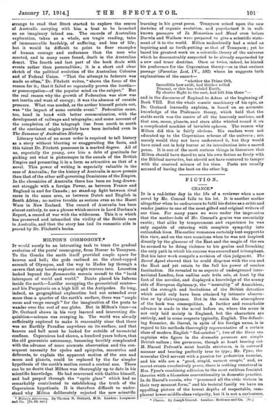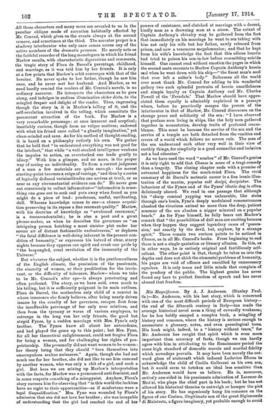FICTION.
CHANCE.*
Iv is a red-letter day in the life of a reviewer when a new novel by Mr. Conrad falls to his lot. It is another matter altogether when be endeavours to fulfil his duties sea critic and render justice to one of the most gifted and original writers of our time. For many years we were under the impression that the mother-lode of Mr. Conrad's genius was essentially exotic; that alike by temperament and experience he was only capable of entering with complete sympathy into outlandish lives. His earlier romances certainly lent support to this view, and on the rare occasions when he was not inspired directly by the glamour of the East and the magic of the sea ho seemed to be doing violence to his genius and forsaking the only path in which his success was assured and triumphant. But his later work compels a revision of this judgment. The Secret Agent showed that he could dispense with the sea and the East and yet retain to the full his power of sombre fascination. He revealed to us aspects of underground inter- national London, torn nullius ante trait solo, at least by the foot of the novelist, and displayed a knowledge of the seamy side of European diplomacy, the " mentality " of Anarchism, and the strength and limitations of the British detective which could only have been attained by intimate observa- tion or by clairvoyance. But in the main the atmosphere of the book was cosmopolitan. A further and remarkable advance is made in the novel before us, where the scene is not only laid mainly in England, but the characters are entirely, and in some respects typically, English. The default- ing financier, de Barra], in spite of his foreign name, is in regard to his methods thoroughly representative of a certain class of modern English " fiat-catcher"; two of the three sea captains who figure in the dramatis personae are simple British sailors ; the governess, though at heart bearing out M. Marcel Prevost's most hostile strictures, la in outward manner and bearing perfectly true to type; Mr. Fyne, the muscular Civil servant with a passion for pedestrian exercise, and his wife are a "good, stupid, earnest couple," and, as recent events conclusively prove, there is nothing unnatural in Mrs. Fyne's combining adhesion to the most ruthless feminist theories with a blameless conventionality in domestic practice. In de Barrel's cousin, who "possessed all the civic virtues in their very meanest form," and his teetotal family we have an appalling picture of the lowest depths of respectable, com- placent lower-middle-class vulgarity, but it is not a caricature.
• Chasm. By Joseph COMM. Loudon: Methuen and Co. [M.]
All these characters and many more are revealed to us in the peculiar oblique mode of narration habitually affected by Mr. Conrad, which gives us the events always at the second remove, and sometimes at the third. The narrator proper is a shadowy interlocutor who only once comes across any of the active members of the dramatis personae. He merely acts as the faithful recorder of the long monologues in which his friend Marlow recalls, with characteristic digressions and comments, the tragic story of Flora de Barrel's parentage, childhood, and marriage, as it was told him by her friends. It is only at a few points that Marlow's orbit converges with that of the heroine. Be never spoke to her father, though he saw him once, and he never met her husband. And Marlow, as we need hardly remind the renders of Mr. Conrad's novels, is no ordinary narrator. He interprets the characters as he goes along, and indulges in endless illuminative obiter dicta, to the mingled despair and delight of the reader. Thus, engrossing though the story is, it is Marlow's telling of it, and the self-revelation involved in the telling, which constitute the paramount attraction of the book. For Marlow is a very remarkable personage: at once innocent and sceptical; insatiably curious, though from no vulgar motives; endowed with what his friend once called "a ghastly imagination," yet clean-minded and sane. As for his method of thought-reading, it is based on a philosophy entirely his own. We gather that he held that "to understand everything was not good for the intellect," that while "a welbstocked intelligence weakens the impulse to action, an overstocked one leads gently to idiocy." With him a glimpse, and no more, is the proper way of seeing an individuality. To form a correct judgment of a man a few materials are quite enough : the merest starting-point becomes a coign of vantage, "and thus by a series of logically deduced verisimilitudes one arrives at truth, or as near as any circumstantial evidence can do." He never goes out consciously to collect information—"information is some- thing one goes out to seek and puts away when found as you might do a piece of lead ponderous, useful, attributing, dull. Whereas knowledge comes to one—a chance acquisi- tion preserving in its repose a fine resonant quality." Marlow, with his doctrine of knowledge as "awakened resonance," is a transcendentalist ; he is also a poet and a great phrase-maker, as when he describes the governess as "an intriguing person hatching a most sinister plot under her severe air of distant fashionable exclusiveness," or deplores " the fatal diffidence in well-doing inherent in the present con- dition of humanity," or expresses his hatred of clear, starry nights because they oppress our spirit and crush our pride by "the bespangled, cruel revelation of the immensity of the Universe."
But whatever the subject, whether it is the gentlemanliness of the English climate, the pessimism of the passionate, the sincerity of women, or their predilection for the irrele- vant, or the difficulty of tolerance, Marlow—whom we take to be Mr. Conrad's alter ego—is always penetrating and often profound. The story, as we have said, owes much to his telling, but it is sufficiently poignant in its main outlines. Flora de Barrel, the motherless only child of a convict in whose innocence she firmly believes, after being nearly driven insane by the cruelty of her gormless, escapes first from the insufferable patronage of her only near relatives, and then from the tyranny or worse of various employers, to estrange in the long run her only friends, the good but stupid Fynes, by a sudden marriage with Mrs. Fyne's only brother. The Fynes knew all about her antecedents, and had played the game up to this point; but Mrs. Fyne, for all her theoretical enlightenment, could not forgive Flora for being a woman, and for challenging her rights of pro. prietorebip. She personally did not want women to be women her theory being that they should " turn themselves into unscrupulous sexless nuisances." Again, though she had not much use for her brother, she did not like to see him annexed by another woman, who was only a chit of-a girl, and such a girl. But here we are mixing up Marlow's interpretation with the facts, for Marlow was a pronounced anti-feminist, and in some respects something of a misogynist. Anyhow, Flora's story excuses him for observing that "in this world the luckless have no right to their opportunities—as if misfortune were a legal disqualification." Mrs. Fyne was wounded by Flora's admission that she did not love her brother ; she was incapable of understanding that the girl had reached the end of her powers of resistance, and clutched at marriage with a decent, kindly man as a drowning man at a straw. The extent of Captain Anthony's chivalry may be gathered from the fact that immediately on his marriage he went to sea taking with him not only his wife but her father, newly released from prison, and now a venomous megalomaniac; and that be kept from his wife's knowledge the fact that this odious lunatic bad tried to poison his son-in-law before committing suicide himself. One cannot read without emotion the pages in which the second mate recounts to Marlow Captain Anthony's hernia end when he went down with his ship—" the finest man's soul that ever left a sailor's body." Sailormen all the world over must thank Mr. Conrad for adding to his wonderful gallery two such splendid portraits of heroic unselfishness and simple loyalty as Captain Anthony and Mr. Charles Powell of the 'Ferndale.' That Marlow should have appre- ciated them equally is admirably explained in a passage where, before he practically merges the person of the interlocutor in that of Marlow, Mr. Conrad discourses on the strange peace and solidarity of the sea : "I have observed that profane men living in ship, like the holy men gathered together in monasteries, develop traits of profound resem- blance. This must be because the service of the sea and the service of a temple are both detached from the vanities and errors of a world which follows no severe rule. The men of the sea understand each other very well in their view of earthly things, for simplicity is a good counsellor and isolation not a bad educator."
As we have used the word "sombre" of Mr. Conrad's genius it is only right to add that Chance is more of a tragi-comedy than a tragedy. The closing chapter ends with a promise of autumnal happiness for the much-tried Flora. The vivid summary of de Barrel's meteoric career is a fine ironic illus- tration of the maxim, populus vult decipi, decipiatur. The behaviour of the Fynes and of the Fynes' idiotic dog is often deliciously absurd. We read in one passage that although his "sharp comical yapping was unbearable, like stabs through one's brain, Fyne's deeply modulated remonstrances abashed the vivacious animal no more than the deep, patient murmur of the sea abashes a nigger minstrel on a popular beach." As for Fyne himself, he fully bears out Marlow's remark that "the possibilities of dull men are exciting because when they happen they suggest legendary cases of 'posses- sion,' not exactly by the devil. but, anyhow, by a strange spirit." There remain two curious points to be noticed in Chance, as in all Mr. Conrad's books. From beginning to end there is not a single quotation or literary allusion. In this, as in other ways, be is entirely original and fastidiously self- reliant. The other point is that, though he takes us into the depths and does not shirk the elemental problems of humanity, his pages are void of offence and unsullied by unnecessary squalors. It is only mean and little minds that complain of the prudery of the public. The highest genius has never found any bars to perfect freedom of speech and has never abused that freedom.











































 Previous page
Previous page